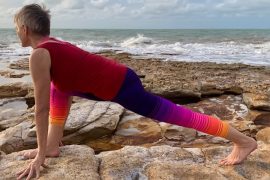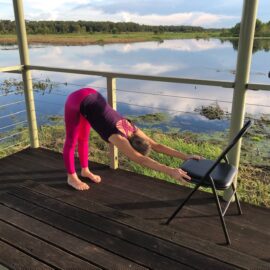“Fuzzy Thinking” From Menopause Is A Good Reason To Consider An In-Studio Or Online Course For Yoga
Men and women have the same brains! In other words, there’s no such thing as a “gendered brain”. But, at certain stages of their life, women`s brains do differ from men`s brains in some respects. Check out Dr Mosconi’s research below. It’s another reason to consider a yoga online course for beginners.
Neuroscientist Dr Lisa Mosconi, in a recent TED Talk, shared the results of her ground-breaking research into how and why female brains age.
Men and women`s brains age differently
The reproductive organs have a huge part to play in brain health and aging.
For women, as they enter menopause, there is a rapid decline in estrogen. This is significant for the brain health and aging of women.
Many of the symptoms associated with menopause; like hot flushes, night sweats, insomnia, memory lapses, depression, and anxiety, actually start in the brain.
We tend to think of these symptoms as starting in the ovaries. In fact, all these symptoms are neurological symptoms. The brain and the ovaries talk to one another every single day.
Estrogen is important for reproduction, but it is also really key for energy production in the brain.
Impact of male and female hormones
When estrogen slows down, female brain neurons start slowing down, and age faster. Studies have shown that this process can lead to early onset of Alzheimer’s disease.
For men, testosterone declines more slowly over their lifetime, and tends to be less fraught with health problems.
In contrast, in midlife, women enter a roller coaster of physical, mental and emotional issues.
Men in middle age appear to not suffer from the same declines in brain energy as women who are going through menopause.
Women have a higher rate of Alzheimer’s disease
Dr Mosconi’s research was worrying in other respects.
Dr Mosconi says that without exercise and lifestyle changes, such as sufficient rest and de-stressing, the neurological issues that can arise in menopause may not right themselves.
Her view is that hormone replacement therapy may not be sufficient. She considers that natural solutions are much better.
She notes that women already have a higher rate of Alzheimer’s. Her view is that the pre-conditions for it can start in menopause.
The good news, she says, is that women are attentive to themselves and their wellness.
But she does advocate some action on your behalf to counter the impact of what she has found.
Using lifestyle for better brain health
Dr Mosconi gives a number of tips on how women can use lifestyle to support their brain health. These include:
- eating a diet rich in phytoestrogens (compounds that occur naturally in plants), and that are part of the Mediterranean diet,
- exercising,
- get plenty of sleep to help brain health,
- reducing stress.
How an in-studio or online course for yoga can help support lifelong brain health.
Based on the dot points above, it’s immediately obvious how yoga can help with implement Dr Mosconi’s tips.
First, yoga is exercise! It can also be especially adapted to where many women find themselves in pre-menopause, menopause, and post-menopause.
Secondly, as I’ve discussed in other posts, yoga is especially effective at improving sleep, and reducing stress.
Third, as I outline below, as well as this video (& especially the description) on mindful eating, yoga improves mindfulness, and this helps you adapt your eating patterns.
Fourth, yoga can now be done in-studio or with an online course for yoga, or both. It’s easy to create your day around getting yoga done, at home, in lunch hours, or out-of-work time.
Fifth, for reasons I outline in this recent restorative yoga video and especially it’s description, yoga is especially good at helping with the well known weight gain associated with menopause.
Other ways yoga helps brain health
Yoga also helps brain health, especially during menopause, in at least these further ways.
- Yoga is a practice to ground your body and mind in the present. In turn, that increases both contentment, and personal performance.
- It helps refresh and rewire the temporary “fuzzy brain” that Dr Moscini discusses in this podcast.
- Plus it helps balance the mind and find peace to cope with erratic mood swings.
- A yoga practice makes us more mindful about the way we live.
- Yoga enables an awareness that all our thoughts and actions have an impact on our health. If you already do yoga, this mind body connection will already be evident to you.
- Through our practice we get to see how it is possible to change. Every day, as you practise, or don’t practise yoga poses, you will see changes, including seasonal changes. Even small changes have a huge impact.
- Being more mindful impacts not just of what we eat, but when we eat, and the frequency that we eat.
With regard to eating, snacking has been shown to negatively impact your immune system.
Eating late at night will impact negatively on your quality of sleep. I’ve discussed the latest research on the even deadly impact of snacking, here.
With regard to sleep, research by Dr Matthew Walker and others, shows that getting a good 8 hours sleep a night is vital for brain health.
Choosing yoga that balances your two nervous systems
If you’re not yet doing yoga, consider in-studio yoga, or an online course for yoga. Try it to calm your nervous system.
(The beginner yoga half price 10 class pack for newcomers, with 2 FREE classes included, can be started at any time).
A key part of why yoga works is that it balances your two nervous systems.
Certain poses rev the body up. They work through your sympathetic, or “fight or flight”, nervous system.
Other poses, such as those we do towards the end of a yoga class, quieten the sympathetic nervous system (or turn off fight or flight nervous system).
These quietening poses, that switch on the parasympathetic, or “rest and digest” response, when practised regularly, will help reduce anxiety, depression, fatigue and the feeling of being overwhelmed.
I’ve discussed elsewhere how anxiety, and more, can be address by yoga.
The importance of good quality yoga
One important reason for choosing good quality yoga, such as Iyengar, is that it includes many poses that work through your parasympathetic nervous system.
Iyengar yoga, in particular, places a lot of emphasis on properly getting into each yoga pose, so you get the full benefit of the pose.
Too much modern yoga, or what passes for yoga, is really aerobic gym moves. It works almost exclusively with your flight or fight nervous system. It does not give you enough good quality poses, sequences of poses, or time in poses, so as to get you the benefits of the “rest and digest” response.
Supine poses, forward bends, shoulder stands will also help you sleep better.
Yoga for female health, also teaches poses that maximise estrogen production from your adrenal glands. This can help offset the menopausal decline in estrogen from your ovaries.
You can get all these benefits via in-studio yoga, or an online course for yoga, or both. Skip to the end if you want more details now.
Poses for “fuzzy thinking” are part of in-studio or an online course for yoga
Inverted poses and forward bends in particular do wonders for “fuzzy” thinking.
Dr Mosconi says many women feel they are going slightly “crazy” during menopause.
I find a yoga practice helps women see this period as a phase they are going through.
It also allows them to find a way to deal with stress which is essential for their brain health, thereby helping deal with the brain changes that Dr Moscini discusses.

The “Downward Dog” pose is a simple inversion, with head below heart
Here is the link to listen to Dr Mosconi’s full Ted Talk.
Best deals for in-studio or online yoga classes for beginners
Check out or buy the in-studio or online course for yoga for beginners at these links.
- Week-to-week in-studio, with 2 weeks free. ($15.95 a week), including access to the in-studio or online course for yoga
- Week-to-week online yoga classes for beginners, with 2 weeks free. ($9.95 a week).
- One casual class, online anywhere, or in-studio (Darwin region). $11 a class.
- Studio or yoga online course for beginners (runs periodically)
- FREE first class for beginners or non-beginners.
At the “Benefits” tab on this site, you’ll also see more on the many other benefits of beginner yoga. You’ll get a powerful mix of these benefits from Flametree’s yoga online course for beginners.
Non-beginner deals, or an intensive in-studio or online course for yoga for women
Do you want to re-start yoga? Non-beginners get four week’s of unlimited non-beginner classes for just $79, either online, or in-studio, or both.
From time to time, Flametree also does Intensive Women Only Workshops. Like our Facebook page if you want to hear more about these short versions of an in-studio or an online course for yoga, with a focus on helping women’s health challenges.
Get a pass, then reserve a class
Get a beginner yoga pass at one of the links above.
Or try 10 HALF price beginner yoga class deal, with 2 FREE classes included.
Then just reserve the classes you want to attend. (You’ll be directed to a further link if needed.)
You can reserve most beginner classes, here.
Non-beginner class reservations, are here.
You can also reserve a class, and then pay by cash or EFTPOS, at the in-studio classes.
If you have questions, please contact Customer Service via the contacts in the footer on this page, or use the Help / Chat box you’ll find on most pages of the Flametree site.
Last, keep an eye on the Flametree Yoga Studio Facebook page, and our emails, for announcements about Women Only Special Focus Classes that I run from time to time.



